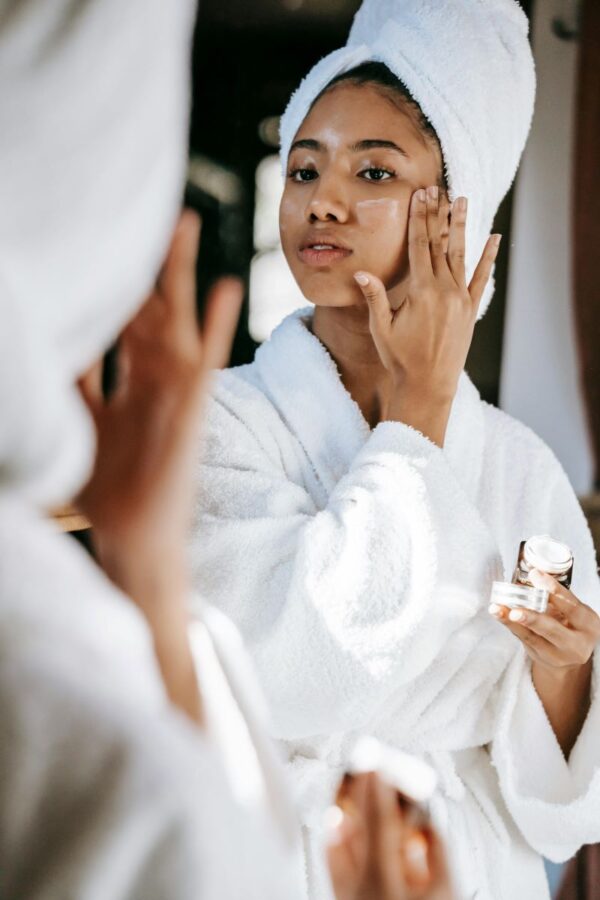Having a consistent skincare routine is essential for maintaining healthy, glowing skin. African skin, with its unique characteristics, requires a personalized approach to ensure it remains nourished, balanced, and protected. Whether your skin is oily, dry, combination, or sensitive, the right skincare routine can help address common concerns such as hyperpigmentation, acne, dryness, and uneven skin tone. Here’s a simple yet effective skincare routine tailored to the needs of African skin.
Understanding African Skin
African skin is often characterized by:
- Rich pigmentation: This can lead to hyperpigmentation and post-inflammatory hyperpigmentation (PIH).
- Natural oils: While many skin types are oily, others can be dry or combination.
- Sensitivity: African skin can be sensitive to certain ingredients, leading to irritation and breakouts.
The Essential Skincare Steps

1. Cleansing: Start with a Fresh Canvas
Cleansing is the first step in any skincare routine, and it’s crucial to use a gentle cleanser that won’t strip the skin of its natural oils. African skin, particularly those with darker tones, can be prone to dryness and irritation if cleansers are too harsh. Choose a sulfate-free cleanser that suits your skin type. A hydrating or creamy cleanser works well for dry skin, while gel-based or foaming cleansers can help balance oily skin.
Cleansing should be done twice a day—once in the morning to remove the buildup from overnight, and once at night to get rid of dirt, pollution, and makeup. Always cleanse with lukewarm water, as hot water can strip the skin of moisture.
2. Exfoliation: Reveal Fresh, Radiant Skin
Exfoliating removes dead skin cells and helps reveal fresh, glowing skin underneath. For African skin, exfoliating is particularly important as it helps to prevent clogged pores, reduce dark spots, and fade hyperpigmentation, which is a common concern.
Exfoliate once or twice a week using a gentle scrub or a chemical exfoliant. Avoid harsh physical scrubs with large beads, as they can irritate the skin. Opt for exfoliants with mild exfoliating agents such as AHAs (alpha-hydroxy acids) or BHAs (beta-hydroxy acids), which effectively slough off dead skin without causing damage.
3. Toning: Rebalance Your Skin
Toning is often overlooked but is a key step in balancing your skin’s pH after cleansing. A good toner helps to close pores, restore hydration, and refresh the skin. For African skin, look for a toner that hydrates and calms the skin, especially if you’re prone to dryness or irritation.
Toners with ingredients like witch hazel, rose water, or aloe vera are great options. These ingredients help to tone the skin while providing soothing and anti-inflammatory benefits. Avoid toners with alcohol, as they can be too drying and may exacerbate skin issues.
4. Serum: Target Specific Skin Concerns
Serums are concentrated treatments that target specific skin concerns, such as dark spots, acne, or fine lines. African skin tends to experience hyperpigmentation, especially after breakouts or sun exposure, so a serum that addresses this issue is key.
Vitamin C serums are great for brightening the skin and reducing dark spots. For hyperpigmentation, consider using serums with ingredients like niacinamide, licorice extract, or alpha-arbutin. If you have acne-prone skin, look for serums with salicylic acid or tea tree oil to help control breakouts and prevent new ones from forming.
Apply your serum after toning, but before moisturizing. Gently press the serum into the skin using your fingertips to ensure it absorbs effectively.
5. Moisturizing: Keep Your Skin Hydrated
Moisturizing is essential for maintaining the skin’s natural moisture balance, especially for African skin, which can be prone to dryness and ashy patches. Choose a moisturizer that suits your skin type. A thick, rich cream works well for dry skin, while lightweight lotions or gel moisturizers are perfect for oily or combination skin.
Look for moisturizers with ingredients like hyaluronic acid, shea butter, or ceramides. These ingredients lock in moisture and help keep the skin soft and hydrated. Be sure to apply your moisturizer while your skin is still slightly damp to lock in maximum hydration.
6. Sun Protection: Shield Your Skin from UV Damage
Sun protection is one of the most important steps in any skincare routine, regardless of skin type. While African skin has a higher melanin content and may be less prone to sunburn, it’s still susceptible to sun damage, which can cause hyperpigmentation, premature aging, and skin cancer over time.
Choose a broad-spectrum sunscreen with SPF 30 or higher. Mineral sunscreens with zinc oxide or titanium dioxide are great for African skin, as they provide physical protection without leaving a white cast. Apply sunscreen every morning, even on cloudy days or when you’re indoors, as UV rays can penetrate through windows.
7. Night Care: Repair and Rejuvenate
Your skin repairs itself at night, so your nighttime skincare routine should focus on nourishment and regeneration. After cleansing and toning, consider using a heavier moisturizer or oil to lock in moisture overnight. Oils such as argan oil, jojoba oil, or rosehip oil are fantastic for African skin, as they hydrate, brighten, and help fade scars and hyperpigmentation.
If you’re targeting specific skin concerns, such as acne or aging, you can apply a treatment or serum at night. Retinol or retinoid-based products can help with skin cell turnover, reducing wrinkles and acne, but should be introduced slowly to avoid irritation.
8. Consistency is Key
A successful skincare routine requires consistency. Stick to your routine daily, and give products time to work before introducing new ones. While results may not be immediate, with patience, you will begin to notice smoother, clearer, and more radiant skin.
Additional Tips for African Skin
- Exfoliation: Exfoliate 2-3 times a week to remove dead skin cells and promote cell turnover. Use a gentle physical exfoliant or a chemical exfoliant with AHAs or BHAs.
- Hydration: Drink plenty of water to keep your skin hydrated from within.
- Healthy Diet: A balanced diet rich in fruits, vegetables, and whole grains can nourish your skin.
- Stress Management: Stress can negatively impact your skin. Practice relaxation techniques like yoga, meditation, or deep breathing.
- Regular Consultations: Consult a dermatologist regularly to address specific skin concerns and get personalized advice.
Final Thoughts
Creating a skincare routine tailored to African skin involves understanding its unique needs and selecting products that address those concerns. From cleansing to sun protection, each step plays a crucial role in maintaining healthy, glowing skin. By incorporating natural, nourishing ingredients and being consistent with your routine, you can achieve your best skin yet. Remember, healthy skin is a reflection of how well you care for it, so make self-care a priority!



